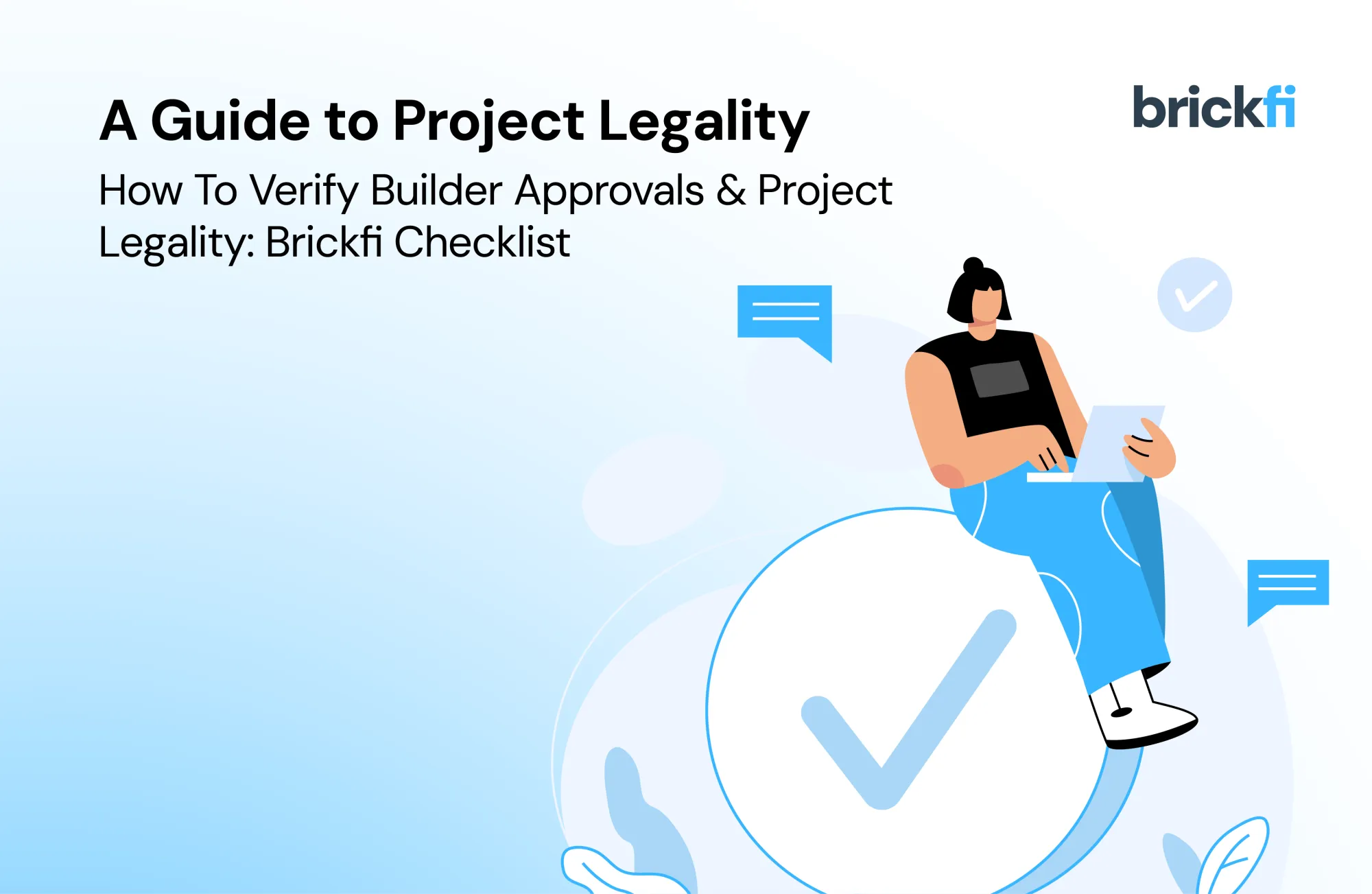How To Verify Builder Approvals & Project Legality: Brickfi Checklist
Before you invest, make sure your builder is legally sound. Use this smart 10-point checklist, RERA checks, license verification, Brickfi360, and more.

Key Takeaways:
- Verifying your builder’s legal status isn’t just a formality, it’s your first line of protection against future risks.
- Start with RERA and basic approvals, but don’t stop there, dig deeper into licenses, NOCs, and title clarity.
- A Brickfi360 report can save you from running between multiple portals by giving you one clear view.
- Past delivery timelines and customer feedback often reveal more than glossy brochures.
- Bank approvals are useful signals, but they shouldn’t replace your own checks.
- A lawyer’s review adds that final layer of assurance before you commit your money.
- Taking a week to verify everything upfront can save you years of stress later.
An Overview: Verify the Legal Status of Your Builder
Verifying a builder’s legal standing is a necessary step for any homebuyer today. It ensures that the project you’re investing in has clear approvals, verified credentials, and no hidden risks.
According to a recent report by the Karnataka Real Estate Regulatory Authority, over 2,600 projects in the state have been flagged for delayed or lapsed delivery. Numbers like these highlight why legal verification is not just a formality, but a safety measure.
In this blog, we’ll walk you through a simple, 10-step process, backed by Brickfi360 insights, to help you check your builder’s legal status with complete clarity.
Why Builder Verification Matters More Than Ever
The real estate market today is complex and often unpredictable. Delayed handovers, incomplete approvals, and abandoned projects are no longer rare cases; they’re increasingly common across major cities. In this environment, glossy marketing campaigns or site visits aren’t enough to make a confident decision.
Legal verification helps you cut through surface-level promises. It gives you a clear view of the builder’s compliance, delivery history, financial backing, and legal standing, well before any risks turn into losses.
Get instant access to expert, data-driven property insights.
Request your free Brickfi investment report now and make smarter real estate decisions today.
Top 10 ways to Check or Verify the Legal Status of your builder
Understanding a builder’s legal standing is not just about scanning one or two certificates. There are several layers involved—registrations, approvals, ownership clarity, and past performance. This checklist helps you go through all the right steps. Each point is practical and can be verified directly or with a little professional help.
1. RERA Registration
Every builder must register their project under RERA. This ensures transparency about timelines, legal documents, and developer credibility. Visit your state’s RERA website and search by the project name to check if all details are up to date.
Where to check: rera.karnataka.gov.in or other state-specific RERA portals.
2. Builder License and Sanctioned Plans
Ask for the approved building plan, land use certificate, and commencement letter. These should be issued by the municipal or development authority. You can also verify the documents directly with the authority if needed.
3. Bank Project Approvals
If a national or private bank has approved home loans for the project, it usually means legal and technical due diligence has been done. Still, use this only as an additional check, not the main one.
4. No Objection Certificates
The project must have NOCs from departments such as:
- Fire safety
- Sewage and water board
- Electricity department
- Environmental body (if applicable)
Review the date, scope, and validity of these NOCs. They are essential for a project to be legally ready for construction and handover.
5. Title and Encumbrance Verification
Ask for the title deed that confirms land ownership. The encumbrance certificate confirms the land is not tied up in loans or legal claims. Both documents should be clear and preferably checked by a legal advisor.
6. Brickfi360 Report
Brickfi360 brings together RERA data, builder history, customer feedback, and approval records, all in one detailed report. It is designed to help buyers get a full picture of legal standing, without jumping from one portal to another.
Get instant access to expert, data-driven property insights.
Request your free Brickfi investment report now and make smarter real estate decisions today.
7. Builder’s Experience and Past Projects
Visit properties the builder has completed. Check how long they took to deliver, how they managed after-sales support, and what condition those homes are in today. Speak to a few residents if you can.
8. Delivery Timeline in the Agreement
The agreement between you and the builder should mention a clear date of delivery. It should also include clauses about compensation if there is any delay. Avoid vague terms or open-ended promises.
9. Customer Feedback and Complaints
Check online reviews and consumer complaint portals. Try to look for patterns; recurring issues around possession, paperwork, or legal disputes can be warning signs. Independent reviews carry more value than generic testimonials.
10. Legal Review by a Property Lawyer
Once you’ve collected all the documents, have them reviewed by a real estate lawyer. They can spot gaps or hidden risks that may not be obvious. This adds an important layer of protection before you make any payment.
Conclusion: Brickfi360 Report
In real estate, trust begins with verification. A builder might promise timelines, quality, and approvals, but unless these claims are backed by facts, the risks remain high. Verifying your builder’s legal standing isn’t just good practice. It’s the most critical step you can take to protect your investment, your time, and your peace of mind.
With Brickfi360, the entire verification process becomes easier, sharper, and more reliable. From license checks to RERA status to customer experience history - you get a full-circle view of your builder’s credibility, in one place.
Before you sign the dotted line, make sure you’ve seen the full picture. Legal clarity today is the only way to avoid regret tomorrow.
FAQs: Brickfi360 Report
1. How can I quickly check if my builder is legally registered?
The fastest way is to look up the project on your state’s RERA website. If it doesn’t show up, that’s a strong sign you need to dig deeper before committing.
2. Is it safe to rely only on a bank’s project approval?
A bank’s approval does mean some checks were done, but it shouldn’t be your only filter. Think of it as one supporting signal, not the full picture.
3. What should I do if the builder hesitates to share key documents?
That hesitation itself is a red flag. A credible builder should be transparent with title deeds, NOCs, and approvals. If they aren’t, it’s worth pausing the deal.
4. If I have a Brickfi360 report, do I still need a lawyer?
Yes, because the report gives you structured insights while a lawyer helps interpret clauses in your specific agreement. Together, they give you both breadth and depth of protection.
5. How long does this whole verification process usually take?
If you have the documents ready, most checks can be done in under a week. Adding a legal review may take a few more days, but it’s time well spent compared to the risks of skipping it.
Get instant access to expert, data-driven property insights.
Request your free Brickfi investment report now and make smarter real estate decisions today.
